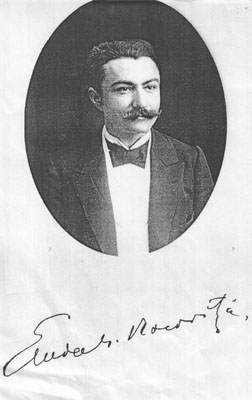 |
My hero is Emil Racovita, a Romanian scientist, explorer, naturalist and speleologist, considered the founder of biospeologie (study of subterranean fauna - caves and groundwater aquifers water). As recognition for his work, he was elected academician and president of the Romanian Academy. Emil Racovita was born on 15th November 1868, in Iasi, a town of Romania and spent his childhood in Soranesti, Vaslui region. He started education in Iasi as a student of Ion Creanga, Romanian writer and later of the geologist Gregory Cobalcescu, and then he continued at "United Institutes". Racovita studied at the Faculty of Law in Paris, following his father's wish, but he also attended the courses at the School of Anthropology. After the success of his degree, he registered for the Faculty of Sciences of the University of Sorbonne, Paris. He entered the Arago laboratories, working on in the marine biological station of Banyuls-sur-Mer, where carried out a series of diving to a depth of 10 meters with an equipment-classic Siebe Gorman, to study life underwater. In 1896 he presented his PhD thesis.
Emil Racovita is my hero because he invested his time in various expeditions to study the fauna and flora, founded a new science called biospeologie, and discovered many species of plants and animals unknown until then; for example during shipment of Antarctica, Emil Racovita had the opportunity to study aquatic life, the huge mammals, the penguins. He remained in the history of science and the discovered the lipped whale.
At the age of only 25, he was elected member of the Zoological Society of France. He was recommended to participate as a naturalist of the Belgian Antarctic Shipments (1897-1899) on board the ship Belgica, led by Adrien de Gerlache. During stopovers made in Chile and the Magellan Strait shores, he carried out research on complex flora and fauna. Near Palmer in the Antarctic, they discover a strait which has received the name of ship "Belgica" and a few islands (an island called Racovita Cobalcescu). During the period when "Belgica" was ice prisoner (March 1898 - February 1899), together with other scientists, made many observations and scientific research. The material was gathered a number of 60 volumes published as a scientific contribution greater than all previous Antarctic shipments taken place. The Romanian scientist made of a study on the lives of whales, penguins and other Antarctic birds, which brought him a well deserved reputation.
Some of the most important works of Emil Racovita are: "Essai sur les problemes biospeologiques" (1907), Biospeologica (1927), Evolution and its problems (1929). The 1300 copies of flora and fauna collected by the regions investigated by Racovita have been studied by many researchers that have described hundreds of types unknown until then in the plant and animal world. On his return he published an important paper on cetaceans, especially whales. In 1907, he published "Essai sur les problemes biospeologiques", the first dedicated to biospeologie in the world. Soon after, he initiated an international research program called "Biospeologica", to study the fauna caves, initially as a private activity, but in 1920, he established in Cluj the first Institute of Speleology in the world. In addition to many Romanian researchers, Racovita brought at Cluj a team of famous biologist friends, two French (Jules Guiart, René Jeannel) and Swiss (Alfred Chappuis). Meanwhile, he also wrote an evolutionist treatise with some original approaches to the subject.
In August 1940, according to the Vienna Dictate, Cluj became part of Hungary, and Emil Racovita moved to Timisoara, while Speleology Institute was led by his friend the Swiss (thus neutral) Alfred Chappuis. After the return of Northern Transylvania to Romania's territory, he returned to Cluj, trying to reorganize the institute, but died before the end, at the age of 79 years.
I will always respect Emil Racovita for his contribution to the development of natural sciences, for his dedication to his work and I am proud he was a Romanian.
Page created on 7/7/2009 12:00:00 AM
Last edited 7/7/2009 12:00:00 AM
